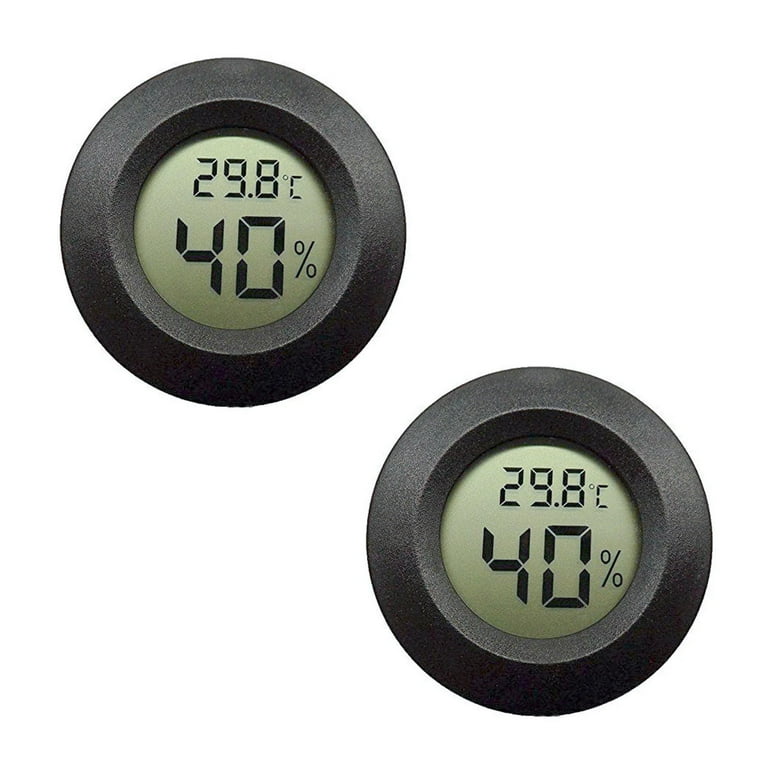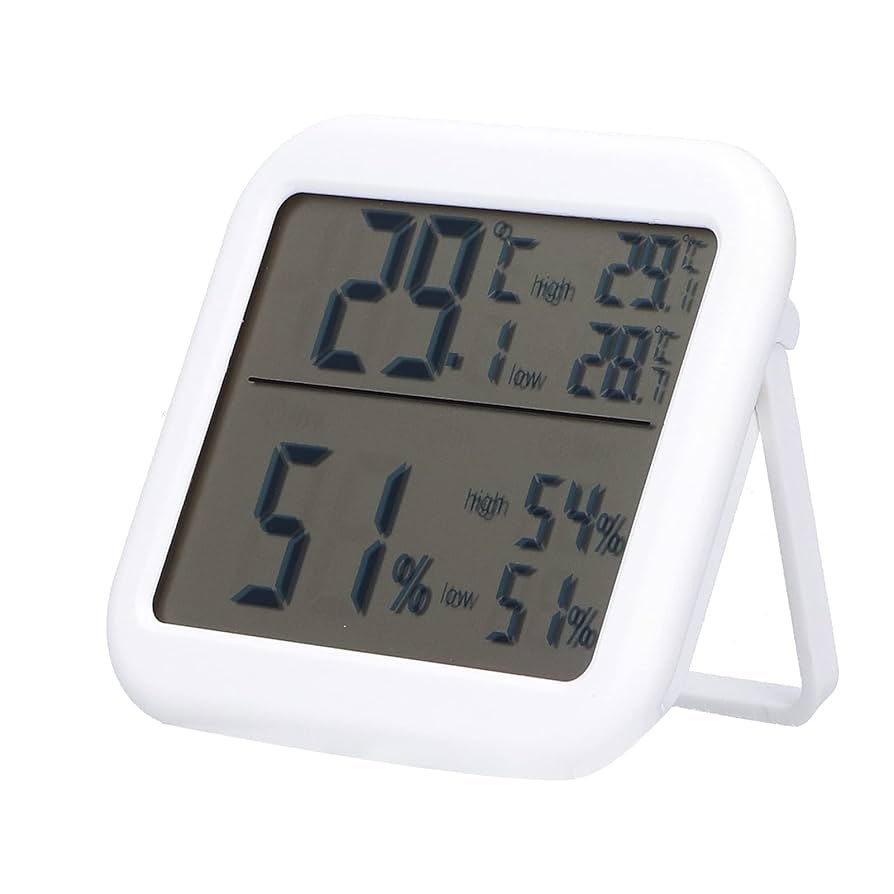Have you ever wondered if your basement needs a special hygrometer? You might think a regular one is enough, but basements have unique conditions that can affect your home’s air quality and structure.
If you want to protect your space from moisture damage, mold, or musty smells, knowing the right way to measure humidity is key. Keep reading to find out why a special hygrometer could make all the difference in keeping your basement safe and comfortable.
Why Measure Basement Humidity
Basements often face hidden moisture problems. Measuring basement humidity helps catch issues early. It protects your home’s structure and air quality. Knowing humidity levels keeps your basement dry and healthy.
Impact Of Moisture On Basement Health
Excess moisture harms basement walls and floors. It causes paint to peel and wood to rot. Mold and mildew grow in damp places. These fungi can cause breathing problems and allergies. Moisture also attracts pests like termites and rodents.
High humidity weakens the foundation over time. It can lead to cracks and leaks. Dry basements stay strong and safe. Controlling moisture protects your home’s value and comfort.
Common Basement Humidity Issues
Basements often have high humidity due to poor ventilation. Water seeps through cracks after rain or snow. Plumbing leaks add hidden moisture. Condensation forms on cold surfaces like pipes.
These issues cause musty smells and damp air. They create an unhealthy environment for your family. Measuring humidity helps find the source of the problem. It guides you to fix leaks and improve airflow.
Types Of Hygrometers
Choosing the right hygrometer for your basement is important. Different types of hygrometers measure humidity in various ways. Some are simple and easy to use. Others offer more features for detailed monitoring. Understanding these types helps you pick the best one for your needs.
Digital Vs Analog Hygrometers
Digital hygrometers show humidity on a clear screen. They give quick and accurate readings. Many digital models are small and easy to place in basements. They often include temperature readings too.
Analog hygrometers have a dial and needle. They work without batteries. Some people like their classic look. They can be less precise than digital ones. Regular calibration is needed to keep them accurate.
Smart Hygrometers With Alerts
Smart hygrometers connect to your phone or home system. They send alerts if humidity is too high or low. This helps prevent mold and damage in basements. You can check humidity anytime, even away from home.
These devices often track humidity trends over days or weeks. They may also link with other smart home tools. Smart hygrometers offer convenience and peace of mind for basement care.
Basement-specific Features
Basements have unique conditions that affect how tools perform. A regular hygrometer may not work well here. Special features help hygrometers measure humidity accurately and last longer in basements. These features matter for keeping the basement dry and safe.
Basements are often damp and dark. Mold and mildew grow easily without good humidity control. A basement-specific hygrometer must handle these tough conditions. It also needs to give clear readings in low light. These qualities ensure reliable monitoring.
Durability And Moisture Resistance
Basements have high moisture levels that can damage simple devices. A good hygrometer must resist water and humidity. It should have a strong case that stops rust and corrosion. Durable buttons and screens prevent wear from wet hands or spills. These features keep the device working longer.
Accuracy In Low Light And Damp Conditions
Basements often lack natural light, making displays hard to read. A basement hygrometer uses backlit or bright screens for easy viewing. It also uses sensors that work well in humid air. This accuracy helps catch moisture problems early. Reliable readings protect your basement from damage.

Credit: www.eaglepeak.com
Placement Tips For Hygrometers
Proper placement of a hygrometer in your basement is key for accurate humidity readings. The right spot helps you track moisture levels effectively. This way, you can prevent mold and damp issues early. Follow these tips to position your hygrometer correctly.
Optimal Locations In Basements
Place the hygrometer at least 3 feet above the floor. This height avoids dampness near the ground. Choose a spot away from windows and doors. These areas have changing air and can mislead readings. Keep it near the center of the room. This gives a good average of the basement’s humidity. Avoid placing it near heat sources like pipes or heaters. Heat can affect the sensor and cause wrong results.
Avoiding False Readings
Do not place the hygrometer in direct sunlight. Sunlight warms the device and changes readings. Avoid corners and closed spaces where air doesn’t flow. Stagnant air can trap moisture, giving false high humidity. Keep the device away from water leaks or wet spots. These spots show higher moisture but do not reflect the entire basement. Check your hygrometer regularly to ensure it works well.
Maintaining Ideal Basement Humidity
Maintaining ideal basement humidity helps prevent mold, mildew, and damp smells. Basements often stay cooler and trap moisture. This makes controlling humidity very important. Proper humidity keeps your basement dry and comfortable. It also protects your home’s structure and stored items.
Using Dehumidifiers And Ventilation
Dehumidifiers remove extra moisture from basement air. They help keep humidity at safe levels. Choose a dehumidifier that fits your basement size. Run it regularly, especially in wet seasons.
Ventilation lets fresh air flow through the basement. Open windows or install vents to reduce moisture. Good airflow stops dampness and improves air quality. Combine ventilation with a dehumidifier for best results.
Regular Monitoring Strategies
Check basement humidity often to avoid problems. Use a hygrometer to track moisture levels daily or weekly. Aim for humidity between 30% and 50%. This range prevents mold growth and keeps air fresh.
Keep records of humidity readings. This helps spot rising moisture early. Adjust your dehumidifier and ventilation based on these readings. Regular monitoring keeps your basement healthy and dry.

Credit: www.walmart.com
Signs You Need A Special Hygrometer
Basements have unique conditions that affect humidity levels. Regular hygrometers may not capture these changes well. Some signs show when you need a special hygrometer for your basement. These tools help monitor humidity accurately to prevent damage and health risks.
Persistent Mold And Mildew Problems
Mold and mildew thrive in damp environments. If these problems keep coming back, your basement’s humidity is likely unstable. A standard hygrometer might miss quick changes in moisture. A special hygrometer detects small shifts early. This helps you act before mold spreads. Tracking humidity closely keeps your basement dry and safe.
Inconsistent Humidity Readings
Basements often have uneven humidity levels. A regular hygrometer may give different readings at different times. This inconsistency makes it hard to manage moisture. Special hygrometers provide more reliable and steady data. They adjust for basement conditions and temperature swings. Accurate readings help maintain proper humidity and protect your space.

Credit: www.amazon.com
Frequently Asked Questions
Do Basements Require A Special Type Of Hygrometer?
Yes, basements often need hygrometers designed for high humidity and low temperatures. These devices accurately measure moisture levels to prevent mold and dampness.
How Does A Basement Hygrometer Differ From Regular Ones?
Basement hygrometers are more sensitive to moisture and temperature fluctuations. They provide precise readings in damp, cool environments common in basements.
Can A Regular Hygrometer Detect Basement Humidity Accurately?
Regular hygrometers may not detect basement humidity accurately due to less sensitivity. Specialized hygrometers ensure reliable readings in moist, cold basement conditions.
Why Is Monitoring Basement Humidity Important?
Monitoring basement humidity prevents mold growth, structural damage, and poor air quality. A proper hygrometer helps maintain a healthy and dry basement environment.
Conclusion
Basements often have higher moisture levels than other rooms. A special hygrometer helps track humidity more accurately there. This tool can prevent mold and damage by giving quick alerts. Regular hygrometers might not handle basement conditions well. Using the right device keeps your basement dry and healthy.
Small steps like this protect your home and improve air quality. Consider a basement-specific hygrometer for better results. It’s a simple way to maintain a safer space below your house.

